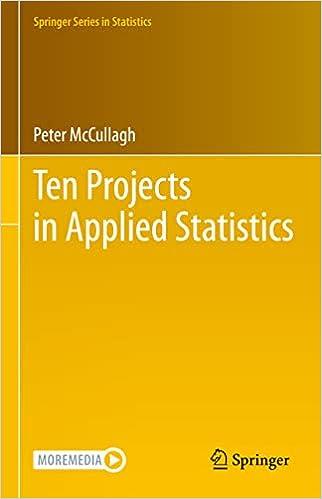For (1 leq i leq k), suppose (Y_{i}=alpha_{i}+epsilon_{i}), where (epsilon_{1}, ldots, epsilon_{k}) are independent standard normal variables,
Question:
For \(1 \leq i \leq k\), suppose \(Y_{i}=\alpha_{i}+\epsilon_{i}\), where \(\epsilon_{1}, \ldots, \epsilon_{k}\) are independent standard normal variables, and \(\alpha_{1}, \ldots, \alpha_{k}\) are exchangeable and independent of \(\epsilon\). Let \(F\) be the joint distribution of \(\alpha\). The goal of this exercise is to find an estimator of \(F\) as a function of the observation \(y \in \mathbb{R}^{k}\). Ideally the estimator should be the maximum-likelihood estimator or an approximation thereof within a set of distributions having some natural symmetry. In the candidate estimators listed below, \(\lambda\) and \(s\) are unspecified scalars, \(\delta_{x}(\cdot)\) is the Dirac measure at \(x, \mathcal{M}_{k}\) is the set of functions \([k] ightarrow[k], \mathcal{S}_{k} \subset \mathcal{M}_{k}\) is the set of permutations, and \(\tau y\) is the composition \((\tau y)_{i}=y_{\tau(i)}\).
\[
\begin{aligned}
& \hat{F}_{0}(\cdot)=\frac{1}{k !} \sum_{\tau \in \mathcal{S}_{k}} \delta_{\lambda \tau y}(\cdot) \\
& \hat{F}_{1}(\cdot)=\frac{1}{k^{k}} \sum_{\tau \in \mathcal{M}_{k}} \delta_{\lambda \tau y}(\cdot) ; \\
& \hat{F}_{2}(\cdot)=N_{k}\left(\mathbf{1} \bar{y}, s^{2} I_{k}ight) .
\end{aligned}
\]
Show that \(\hat{F}_{0}\) and \(\hat{F}_{1}\) are both exchangeable with the same marginal distribution, and that \(\hat{F}_{1}\) also has independent components. For \(\lambda=1\), these are called the permutation estimator and the bootstrap estimator respectively.
Step by Step Answer:






